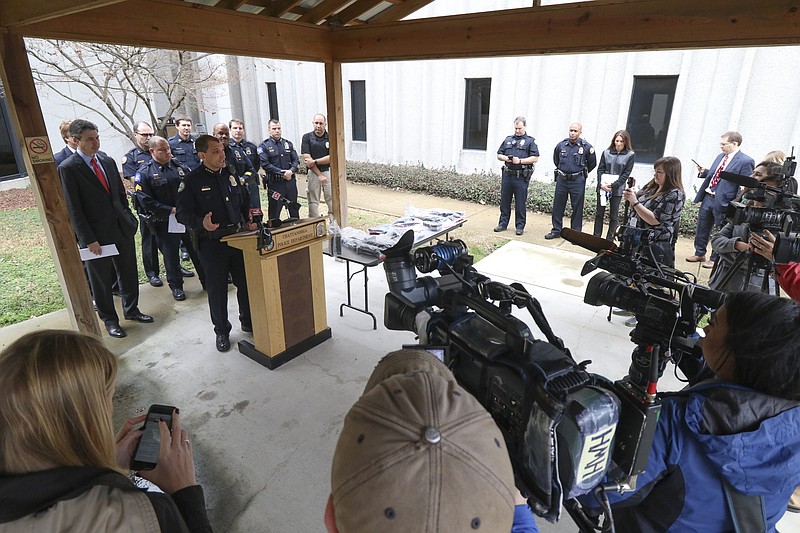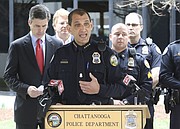Chattanooga police will double the number of officers working to stop gang and gun violence in the city, officials announced Monday.
Now about 20 people work full time on gang and gun violence, and that will jump to 40 as police roll out a new strategy designed to stop violence in the city, police said. Chief Fred Fletcher also plans to hire another 14 police officers, raising the number of officers on the force to 500.
Monday's announcement came on the heels of a bloody weekend in Chattanooga that left two people dead and another five people wounded in shootings.
The new strategy will focus on three main areas: enforcement, community involvement and aggressive prosecution of federal gun laws, Sgt. Josh May said.
Officers have seized more than 3,700 illegal guns off Chattanooga's streets since 2012, including 991 in 2016, records show. As part of the new enforcement plan, police will create a five-person team to focus solely on guns, May said, and the team will focus on investigating those cases.
The department also will turn its current street crimes unit into a dedicated gang unit, May said. Unlike the department's previous crime suppression unit, which was a discretionary team that could handle a variety of tasks, the new gang unit will focus only on gang violence, May said.
CHATTANOOGA SHOOTINGS BY YEAR
2017 to date: 72016: 1322015: 1192014: 1142013: 123Source: Chattanooga Police Department
WEEKEND SHOOTINGS
Friday: Jumoke Johnson, 23, and Christopher Woodard, 20, are shot to death on E. 12th Ave.Saturday: Three women are shot while riding in a car around 2:40 a.m. on E. 3rd Street.Sunday: A woman shoots Dieshunn Lindsey, 30, in self-defense on Duncan Ave.Sunday: Kendric Evans, 20 is shot on South Lyerly Street.Source: Chattanooga Police Department
Police also plan to create Rapid Response Teams across the city to try and get ahead of violence as it is developing, especially as fights begin on social media.
"As we've seen over the last several years with the proliferation of social media, what used to take weeks to turn into violence now takes literally minutes," May said. "Having someone who can respond to that and stop potentially violent situations prior to them becoming violent is an absolute necessity."
Investigators will conduct in-depth follow-ups on every shots-fired call they receive, May said.
Authorities are also beginning the Chattanooga Federal Firearms Prosecution Partnership, which will be a collaborative effort among the offices of the U.S. Attorney for the Eastern District of Tennessee, the Bureau of Alcohol, Tobacco, Firearms and Explosives, the Hamilton County District Attorney and police. The goal, May said, is to bring heavy prosecution against people who violate federal firearm laws.
The idea of heavy prosecution is a key part of the Violence Reduction Initiative, a program Mayor Andy Berke rolled out in March 2014 to try to reduce gang-related gun violence.
The city has spent more than $1 million on the VRI, but since it began in March 2014, gang-related shootings have not dropped. In fact, shootings rose from 63 in 2014 to 80 in 2015, with 80 more in 2016, police said. Chattanooga saw 33 homicides in 2016, the highest annual number since at least 2001.
The new approach will not replace the VRI, Fletcher said. The department will continue to hold call-ins, conduct enforcement actions and focus on gang members, he said, and the city is still paying $22,000 to the National Network For Safe Communities, the organization that pioneered the approach behind the VRI.
Fletcher said the department will continue to use the VRI despite the lack of results because it is "what the community demanded."
"This community has said, 'We want you to focus on the people driving the violence,'" Fletcher said. "'We want you to use limited resources, finite taxpayer dollars and a discreet amount of goodwill and focus on the small number of people who commit crimes.'"
He said the 14 new hires will allow the department to continue the VRI while also implementing the new strategy.
The request for just over $1 million to fund the new positions awaits approval from the City Council.
The department's new strategy will rely heavily on the National Integrated Ballistic Information Network, a tool that can match shell casings to guns and to other shell casings, similarly to the way police track fingerprints.
Police spent about $200,000 to buy a machine that can run shell casings against the NIBIN database in Chattanooga instead of sending the evidence to Nashville for testing. Processing the evidence locally is faster and allows for more shell casings and weapons to be analyzed.
Investigators have been using the new system for several weeks, and believe it will make it easier to solve shooting cases, connecting bullets to guns and guns to shooters even when witnesses won't cooperate.
"What we need to do is connect those guns to the people and the crimes they commit," Berke said. "And the more we can do that, the better off our city will be."
Contact staff writer Shelly Bradbury at 423-757-6525 or sbradbury@timesfreepress.com with tips or story ideas. Follow @ShellyBradbury.



